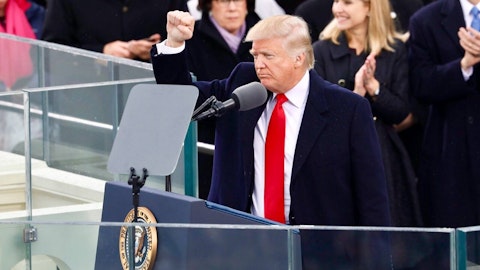Most of the time investors don’t get hurt badly when they don’t pay attention to macro developments. That’s because business cycles are measured in several years and large macroeconomic shocks rarely occur. Considering that investors’ average holding period of stocks is only a few months, it is understandable that they do not pay too much attention to macroeconomic shifts.
In terms of foreign trade we have been in a very long climate. Average hourly wages for most US workers have been stagnant for decades whereas business profits and stock prices have been on a tear. S&P 500 Index returned an average of 11.8% annually since the beginning of 1982. The inflation adjusted return of the S&P 500 Index is a mind blowing 8.9% during the same period.
If you are an average American, it is more than likely that your real wages haven’t budged much over the last 36 years whereas stock market investors see their wealth go up 21 fold after adjusting for inflation. This created a large gap between haves and have-nots, and opened the door for Trump presidency. To be fair Trump has been very successful at identifying this opportunity and delivered the right message to get elected. He has also been trying to keep his promise for the last 2 years.
Trump’s first major accomplishment, the tax cuts, was a huge win for corporations. That’s why the S&P 500 Index returned nearly 22% in 2017 and still going strong in 2018.
However, I feel investors haven’t grasped the ramifications of Trump’s new initiative. Donald Trump promised to make America great again by bringing back jobs lost to offshoring (mainly to China). This is the main reason why real wages for most American workers have been stagnant, and it is one of the main reasons why corporate profits and stock prices have been increasing for decades.
Corporations were able to reduce their costs and increase their profit margins by taping into the dirt cheap foreign labor markets. China became the manufacturing hub for the most successful American companies. They either produce their entire product overseas or import the main ingredients from east Asia. Now that Trump is reinstating tariffs to protect American workers we should start seeing an increase in real wages in this country and a decline in business profits. This won’t happen overnight which is probably why most investors are complacent about the impending changes on the trade front. You can check out the list of Chinese stocks hedge funds are buying despite the trade war.
Yesterday billionaire Nelson Peltz’s Trian revealed a 7 million stake in PPG Industries Inc. (PPG). Nelson Peltz has a great reputation as a long-term investor. Probably because of this reputation effect PPG Industries shares are up 2.5% this morning.
We disagree. Nelson Peltz was a great long-term investor but he isn’t anymore. Insider Monkey tracks the stock picks and performance of more than 700 hedge funds. Our research has shown that hedge funds’ overall performance has been going down over the last decade. Most hedge fund managers with stellar reputation can’t generate any meaningful alpha anymore. That’s why we now focus on the 100 best performing hedge funds. Our flagship strategy invests in the consensus picks of these best hedge fund managers and managed to return 121% since its inception in May 2014, vs. 66.7% gain for the S&P 500 Index (see the details). Unfortunately Nelson Peltz isn’t among the 100 best performance hedge fund managers at the moment.
Nelson Peltz has been burned by ill-timed investments in General Electric (GE), Procter&Gamble (PG), and now PPG Industries (PPG). PPG is Peltz’s brand new investment that he has been building a position since the second quarter. PPG shares lost about 10% since October 2. The culprit is increasing costs due to Trump’s tariffs and declining profits.

We aren’t really cherrypicking these stocks from Peltz’s portfolio. If you investing in Peltz’s portfolio using the same portfolio weights used by Peltz, you would have returned 0.71% per month between 2014 and 2017. Unfortunately S&P 500 Index returned 0.99% per month during the same period. This means Nelson Peltz’s stock picks underperformed the market by more than 3.5 percentage points annually over the last 4 calendar years. Our calculations also show that Peltz’s stock picks outperformed the market by 2.5 percentage points annually between 2008 and 2017.
These results support our thesis that hedge funds manage too much capital and they are forced to deploy this capital into less and less attractive investment opportunities. Industrial companies like General Electric (GE), Procter&Gamble (PG), and PPG Industries (PPG) will be negatively affected by the global macro developments. We said this about Warren Buffett and now we are saying this about Nelson Peltz. There are a lot of opportunities in the small-cap space and if you do your work, you can identify stocks that’ll outperform the market by a large margin. Most investors don’t have billions to invest, so they can generate giant returns by investing in small-caps. Warren Buffett and Nelson Peltz can’t.




